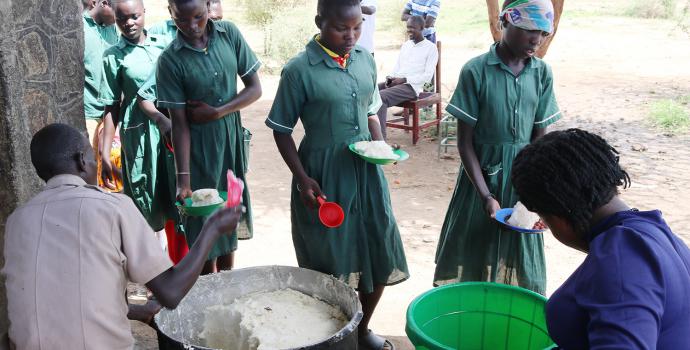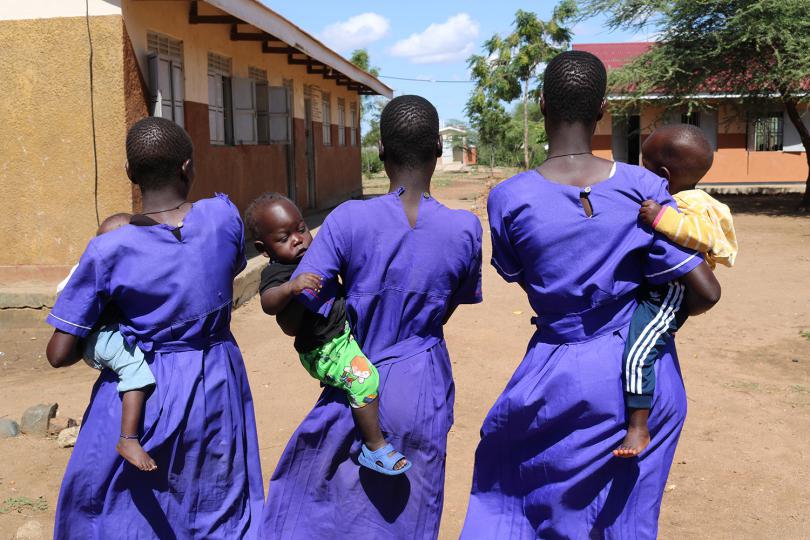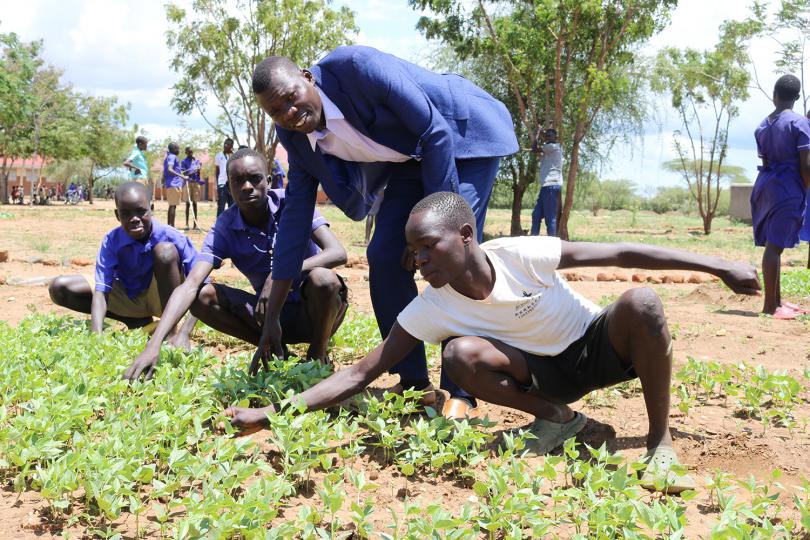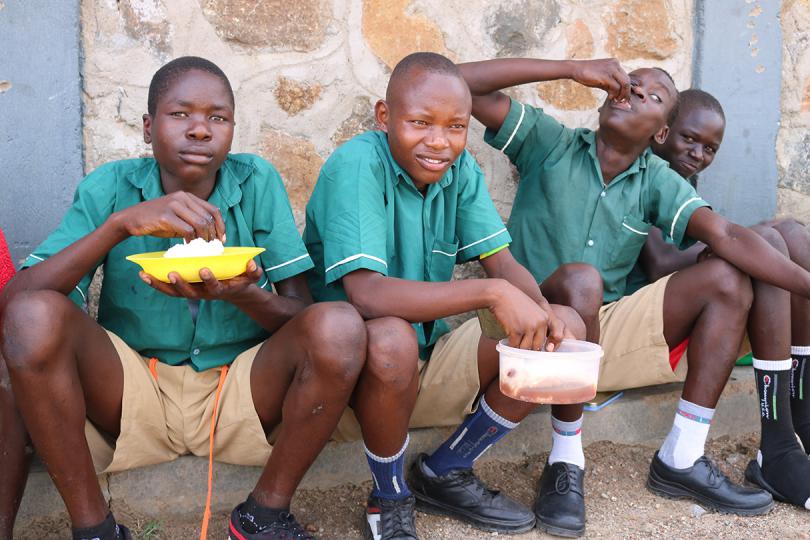SESBIL Project Brings Transformative Change to Karamoja

The Strengthening Education Systems, Bridging Learning Loss (SESBIL) project, implemented by Save the Children, has significantly improved the lives of children and the state of education in the Karamoja sub-region over the past three years. Lokeriaut Community School for example, which was struggling with low enrollment and poor facilities, has seen remarkable progress, according to Dominic Lokutan, the head teacher at the school.
"In 2021, our school enrollment was very low," Dominic said. "We had only 300-400 pupils, but today we boast of 910 children,". He attributes this increase to the SESBIL project, which has changed the image and perception of the school in the community. The project has improved hygiene standards by providing soap and sanitary pads for girls, which has facilitated regular school attendance. Additionally, the school has constructed latrines, improving sanitation and convenience for students.
The project has not only increased the number of students but has also fostered an environment where education is valued. Lokutan highlighted that child mothers and reformed rustlers have joined the school, reflecting a significant social change. "At least four of the raiders have transited to secondary school in the past years," he noted.
Under the SESBIL project, teachers have received training in making instructional materials and have developed high professional self-esteem. Sofia Lokwi, in charge of professional development at the school, noted that teachers are now very creative and capable of making reusable pads, among other skills.
"Some of us could not even speak,’ Sofia noted, adding that, “Our career has been further developed through several project activities. We have learnt a lot,”. Co-curricular activities have also seen a boost, with three learners qualifying for national athletics in Kitgum. The school management committee has been trained to monitor school activities, leading to reduced dropouts and improved educational outcomes.
The provision of porridge and food has promoted attendance and improved the health of children. “Over the years, the project has promoted attendance through the provision of porridge and food. During the project period, malnutrition cases in schools have reduced,” said Mark Angolere, a teacher.
Micheal, a former cattle raider, praised the project for giving him a chance at education. "The project closure is a big blow to some of us who have been beneficiaries of the initiative by Save the Children," he said, hoping for continued support from funders.
Abraham Loote, the School Management Committee Chairperson, highlighted the project's role in improving literacy and reducing hunger-related deaths. He urged for the project's extension, stressing that education has become a valued pursuit among parents who previously held negative views towards it.

Increased enrollment and retention
There was a substantial increase in the enrollment and retention of learners. The average enrollment in each of the schools was 250 learners at the start of the project. This increased to an average of 1100 learners by the end of the project. Furthermore, at the start of the project, the average enrollment of girls was 10% and by the end of the project, more than 50% of those attending school were girls. The project also allowed older children to attend school with their younger siblings. This enticed many of them to attend school, resulting in increased retention.
Learner transition
Throughout the project implementation, a total of 102 learners sat and passed the National Primary Leaving Examinations (PLE) and transitioned to post-primary education. In addition, more than 2000 learners were transited to the mainstream/formal school at the end of the project.
Transfer of Cash for Scholastic materials
Over the course of the project implementation, a total of 7 unconditional cash transfers were made to the parents of the AEP learners (one cash transfer per term). This cash grant was meant to support the purchase of scholastic materials to enable the learners to return and stay in school.
School improvement plans
The project team worked in close collaboration with the officials from the Office of the District Education Office to review the School Improvement Plans (SIPs) for all five schools supported by the project. The SIP review focused on the five elements of the Save the Children Quality Learning Framework (Emotional and Psychosocial Protection; Physical Protection; Teaching and Learning; Parents and Communities; and Policies and Systems). Thereafter, each school was supported with 5,000,000 UGX unconditional grant transferred directly to each school bank account to implement SIPs priorities. This figure was collectively arrived at by education stakeholders at the project initiation.
Teachers’ continuous professional development (CPD)
The project worked closely with the District Education Office to support the professional development of all 43 AEP teachers deployed in the five schools. To this effect, periodic refresher teacher training workshops were organized to equip the teachers with skills in inclusive education programming as well as AEP Approaches and Pedagogy. A total of 43 teachers (18F, 25M) and 5 headteachers were trained.

AEP Teaching and learning materials
As part of the strategy to improve the knowledge and competency of AEP learners a total of 1,015 AEP textbooks approved by the National Curriculum Development Center (NCDC) were procured. This comprised of 445 textbooks for level II and 570 textbooks for level III covering all subjects taught at the primary school level in Uganda.
Menstrual Hygiene Management Training
The project partnered with Wabibi Pads to conduct training of adolescent girls and boys on menstrual hygiene management across all 5 AEP centers. The objectives of the school-based training were to equip girls and boys in reproductive age bracket as well as senior men and women teachers with knowledge and skills of making reusable sanitary pads using the most available materials, usage, storage, and menstrual hygiene management. In addition, all 5 schools annually received emergency sanitary kits to minimize absenteeism during menstruation.
Construction of Latrine and Classroom Block
In a bid to Improve access to quality learning opportunities and learning outcomes for primary & AEP learners, two 3-classroom blocks were constructed at Kodonyo and Lokeriaut primary schools. The decision to construct at Kodonyo and Lokeriaut primary schools was a result of the overwhelming enrollment in the two schools as a result of the AEP programme.
Stakeholder engagement
The project team worked closely with Moroto district education department, the department of community development, the sub-county administration, parents, communities, and children in implementing project interventions to strengthen systems and ensure sustainability. The main areas of collaboration were in the areas of establishment of the school garden and good agronomic practices, quarterly school supervision and training of teachers, reflection, and feedback meetings as well as coordination meetings.
School feeding program
In addition to the cash grants transferred to the schools for the purchase of food, the project also trained a total of 122 (46F, 66M) school management committee (SMC) as well as Parent Teacher Association (PTA) members on basic agronomic practices to equip them with knowledge and skills of establishing school gardens and production of vegetables. In addition, the project procured seeds and supported each school to establish a total of 4 acres of school gardens for cultivation of food that will supplement the food purchased through the cash transfer to the school management committee to support school feeding.

About the Project
The Strengthening Education Systems, Bridging Learning Loss (SESBiLL) was a 3-year Basic Education Project that started on 1st June 2021 and closed on 31st May 2024. The project was funded by the Norwegian Embassy in Uganda to the tune of 15 million NOKs with an overall aim of helping primary school and AEP learners return to school, recover learning losses, complete curriculum content and gradually improve learning outcomes.
The project targeted out-of-school children whose learning was affected by school closure due to the Covid-19 pandemic. The primary beneficiaries included teenage mothers, learners who had dropped out of school for over one year and found it hard to enroll in a formal school system, and children in child-headed households.
The project was implemented in partnership with the Norwegian Refugee Council (NRC) as the lead Partner with Save the Children implementing in Karamoja to pilot the expansion of AEP in non-refugee hosting contexts covering 5 community schools of Atedeoi, Lokeriaut, Lolet-ekia, Musupo and Kodonyo in Moroto district.